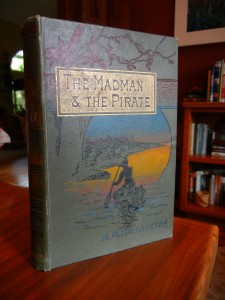The Madman and The Pirate, by R.M. Ballantyne
This is another book I purchased at a used book store during my recent trip to England. The striking cover is what drew me to the book, and of course a title like The Madman and The Pirate is more than enough to catch my eye! Published in 1883, the book captures the spirit of the English empire in both good and bad ways.
Like the The Sword of the Lord that I reviewed earlier, this book was given as an award to a student. In this case it was given to “George” for his essay on “What is Wanton Cruelty to Animals” at the Scottish Society for the Prevention of Cruelty to Animals event. The book has seven quite striking illustrations of various scenes in the book, and as I mentioned the cover is really beautiful. They don’t make them like this anymore!
R.M. Ballantyne wrote this is a children’s book, so I didn’t expect a brilliant plot. But the story is still fun: a missionary and his son on a South Pacific island are captured by pirates, the son is tossed overboard, and the father goes mad on a remote island. The son survives, is reunited with his crazed father, and together they reconcile with the pirate. Somewhere along the way the entire population of the islands become followers of Christ, and the pirate himself is restored in good grace through his confession and acceptance of Jesus.
Is it over the top? Yes. Is it culturally offensive at times? Yes. Is it racially biased? Yes. Is it gender biased? Yes. I could go on, but you get the idea. This is not a book that is going to make a comeback in our post-modern times.
But here’s the thing. It offers truly unique insight into the English psyche that drove a small country into becoming an empire. The English were on a mission to save the world from pagan thoughts and cultural weaknesses. Their’s was the right way, and it was native in the English soul to be the light to the world. Indeed, it was an obligation to be bold, courageous, noble, confident, and humble before God.
There is something attractive about that. The faults of the book were the faults of the entire age and throughout all cultures, not just the English, so I can overlook them. In our cynical age it was refreshing to read a book that promoted the idea of virtue in action. It created heroes, villains, reconciliation.
I can’t recommend the book for anything but the unique cultural and historical insight it offers into that particular age. But if such an insight interests you, you won’t be disappointed.

